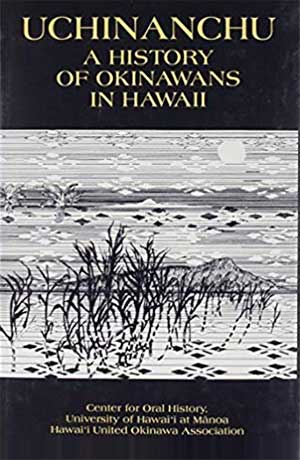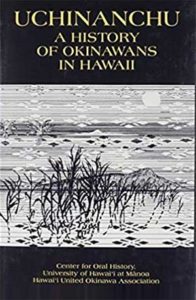
Okinawan Culture Hawaiian Style

Amazon »
Okinawan culture, a Hawaiianized version of the native original, is healthy and flourishing in Hawaii today. That is no small feat for an ethnic sub-group that constitutes perhaps 10 percent of Japanese Americans in Hawaii and is, for the most part, indistinguishable in appearance, language, culture and achievement by most outsiders from the Naichi, or Japanese from the four main islands-Hokkaido, Honshu, Kyushu, and Shikoku.
The continued endurance and evolution of Okinawan cultural forms in Hawaii owe much to both the uniqueness and aesthetic sophistication of the forms as well as the nurturance, faith, and pride of the Okinawa community in Hawaii….
…Dr. Nobuyuki Nakasone, patron of Okinawan dance in Hawaii, offers an historical explanation:
The limitations of geographical and geologic conditions coupled with the political and economic pressures brought to bear upon this little kingdom by outside forces, made it difficult for Okinawa to develop a great material culture. Those harsh factors, however, did not suppress or blunt the innate creativity and joy for life and living in these people….It may be said that to music and dance the people of Okinawa gave themselves and these pursuits in turn enriched them spiritually and gave them courage to live their frugal lives.
… In a recent interview, Fumiko Higa Yoshimoto, a nisei woman of Okinawan ancestry, recalls with great fondness the wonderfully rich childhood in an all-Okinawan plantation camp called Amauulu Camp 4 on the Big Island’s Hamakua Coast. The camp, composed of about 35 families, all Okinawan, except for one Naichi family, had a community bath, a cooperatively run store, and celebrated traditional festivals together…This one camp, with its warm remembrances of kinship, cooperation, and love, epitomizes what Okinawan culture has meant to many people of Okinawan ancestry in Hawaii.
Perhaps the Okinawans made an extra conscious effort to make their community a place of cultural richness and human joy. Faced by the obstacles set by the larger haole-dominated community as well as the prejudices of their Naichi neighbors, the Okinawans turned to their culture for more than a common bond of identity. They turned to their culture as a means of solace, a source of individual and group pride, and a basis of healthy self-concept and expression…
Music and Dance
…Music permeated all classes of Okinawan society; commoners were not restricted from playing classical music. The Okinawan musician of any class was always recognized with special respect by society.
Among the commoner, mo-ashibi (field play), an evening of courtship, folk songs, and dances for young men and women of the village, was a popular tradition by the early immigrants. Thus for these immigrants, their early communities would not have been Okinawan without music…
…The early Okinawan immigrants to Hawaii kept alive their heritage of dance by sponsoring performances by troupes from Okinawa, encouraging their children to take dance lessons from the few gifted performers in the community and unabashedly participating in informal dancing at parties, weddings, and other intimate celebrations. The annual Bon festival afforded the major opportunity for the entire community to participate in the popular dances of the homeland and pass on the tradition of dance to the American-born generations…
Foods
…Many second-generation Okinawans continue to prepare traditional Okinawan dishes for their daily family fare. In addition to ashitibichi, another popular pork dish of Okinawan cookery is rafute, which is prepared with sugar, soy sauce, and lots of liquor (awamori) to help in preservation.
Tofu dishes are also stranded fare for Okinawan-style meals. Champuru … is an outstanding stir-fry tofu dish cooked with a variety of vegetable and sometimes a little meat…
… Elinore Takamine Fujii, chairperson of the food service department at Kapiolani Community College and a nisei woman of Okinawan descent, describes Okinawan cuisine as “in between the Japanese sweet, light and clear taste, and the Chinese flavored, spiced and herbed taste. “
…Although tofu and kubu (dried kelp) are mainstay ingredients in Okinawan dishes, Okinawans are also known to consume healthy portions of sweet potato, squash, eggplant, goya (bittermelon), green papaya, mustard cabbage, daikon, somen, and udon. Other commonly used foods include taro, gobo, shiitake and fish.
Uchinaguchi (the Okinawan Language)
Uchinaguchi is considered a dialect of the Japanese. The Okinawan dialect is estimated to have separated from the Japanese dialect sometime between the beginning of the 6th century and the middle of the 12 century A.D. The Okinawan dialect is said to be nearer the original Japanese to the have preserved the language of ancient Japan in the use of archaic words and phrases…
…Most Okinawan immigrants to Hawaii, being peasants from rural areas, spoke one or another of the regional dialects….
The words and phrases shared here have come from words and phrases commonly used by families in their daily lives. There will be regional differences in spelling, pronunciation, class, and gender.
Words
Uchinanchu
Person of Okinawan ancestry
chiburu
Informal reference to an Okinawan person
Yamatunchu
Japanese person from the mainland
dushi
friends
ikiga
man
iangu
woman
warabi
child
gusūyo/gusuyō
ladies and gentlemen
ussan
happy
irikisan
happiness
nachikasan
sad
kuneti
forgive me
dikiton
did well
i wachichi
fair weather
yana wachichi
badweather
su karasan
salty
amasan
sweet
masan
delicious
mi gusui
pleasing to the eye
chimu jurasan
kind, good-hearted
Phrases
Haisai
Hello
Ukimi soo chi
Good morning
Chaganju yami semi
How are you?
Ganju soi bin
Fine, thank you.
Guburi sabira
Good bye
Yukuimi sore
Good night
Mensore
Welcome, please come in.
Ippe nihe debiru
Thank you very much
Hekuna
Hurry up
Akisamiyo
Oh my goodness
Chibariyo
Go for it!
Unju ippe churakagi
You are very beautiful
Menichi hatarachon/Menichi pata pata
Working very hard everyday
Muru Uchinanchu
Everyone is Okinawan
Uchinanchu Proverbs
Once we meet and talk, we are brothers and sisters.
Uya yushi kwa yushi.
Parents and children teach one another.
Kuu sa kana sa.
Small things are lovable.
Kutuba jin chikee.
Spend words as efficiently as money.
Kutuba noo ushikumaran.
A word cannot be recalled once spoken.
Shinjichi nu ada nayumi.
Kindness will never be wasted in any way.
Jin too waraaran kwa tu ru waraariiru.
We can laugh happily with our children, but not with money.
Choo kukuru ru dee ichi.
The heart is the most essential human quality.
The old people are treasures to us.
Shikinoo chui shiijii shiru kurasuru.
Let’s live helping each other in this world.
Munoo yuu iyuru mun.
Speak well of others.
Choo kani ru deeichi.
Common sense is essential.
Yii kutoo isugi.
Do good things quickly.
Yuu ya shititin mii ya shitinna.
Even if you hide yourself from the world, don’t lose sight of your real nature.
Acha nu neen chi ami.
Tomorrow is a new day.
Mookiraa kwee michi shiri.
Once you have made a fortune, know how to spend it.
